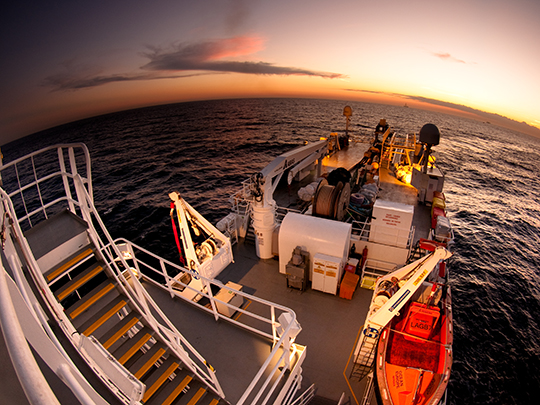Global Team Demonstrates Core Competency
Case Study: OceanGeo
In business, there is often an increasing need to demonstrate health and safety competence in order to win business. This is particularly true for companies providing services to the oil and gas industry.

OceanGeo specialises in acquiring seismic data from the ocean floor. Its information helps oil and gas companies make drilling decisions and understand geological conditions. Most of OceanGeo’s employees work offshore in very challenging maritime environments. Health and safety is not only important in terms of their overall protection, but also because of the high standards often demanded by the industry they operate in.
As OceanGeo’s Chief Executive Officer, Colin Hulme explained: “Both health and safety affect our core business in multiple ways, and our safety records are an essential element of business performance. When prospective customers conduct due diligence, one of the first steps they do is review our procedures, training, reporting mechanisms and safety statistics, and compare those with competitors.”
Because of this, Colin together with Chief Operating Officer Tim Rigsby, set out to identify an “independent training and review platform” that they believed would “best prepare employees to implement and sustain the company’s H&S standards and workflows.”
They chose the NEBOSH International General Certificate in Occupational Health and Safety (IGC). NEBOSH’s International General Certificate is suited to the global nature of OceanGeo’s operations, as it is based on international standards making it suitable throughout the world. It also provides a recognised qualification that is respected globally. The qualification has been accredited by the Scottish Qualifications Authority (SQA) and sits at Level 6 on the SCQF and attracts 15 credit points.
Flexibility was an important factor too, according to Tim Rigsby, who explained how crews rotate on and off sea vessels and are deployed on projects for months at a time.
“Logistical challenges are ever present,” he said. “Training courses need to take place in Rio de Janeiro, Houston and Paris as required.”
Things have been progressing well. A “first phase” of training called for virtually all line management personnel, off shore and on shore, to participate. Over the past 12 months, one fifth of OceanGeo employees have earned their NEBOSH International General Certificate and the company has set a goal for this to grow to 60% in 2015. A “second phase” will include training for a broader range of employees including non-managerial personnel. Ultimately, OceanGeo wants all of its employees to hold NEBOSH certificates.
The company says it has already seen a “clear improvement” in health and safety understanding, which in turn has had “a positive effect on the practices in the workforce at large.” The quality of reporting and the ability of management to both recognize and solve issues have both improved.
OceanGeo’s Tim Rigsby said: “It is essential that our personnel demonstrate core competency in HSE, and that they can back that up by making informed decisions and taking the right actions when needed. As a further commitment to this principal we are planning for all of our Quality, Health, Safety and Environment (QHSE) Team to undertake the NEBOSH International Diploma so that they have a higher level of understanding.”
CEO Colin Hume added: “Having safety trained personnel across all management roles goes a long way in elevating our safety culture across the company. The seismic industry, and the oil and gas industry at large, is governed by risk. Using the right tools and expertise, including key safety measures to identify and reduce risk, presents a fundamental value that we owe to our employees and our customers.”
